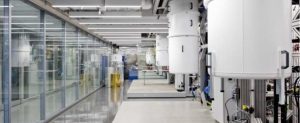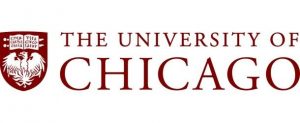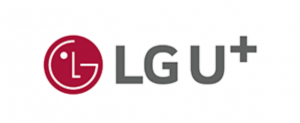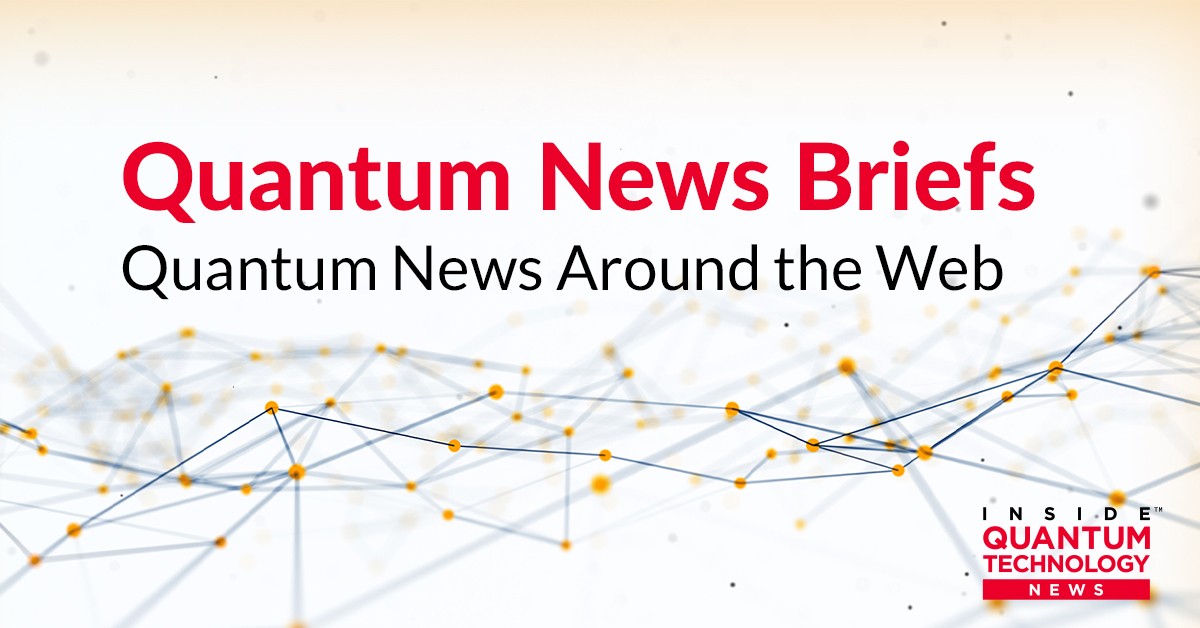Quantum News Briefs October 10: President Biden touts IBM’s plans to invest $20 Billion in NY, predicts it will make the region a hub for quantum computing; Chicago scientists are testing an unhackable quantum internet in their basement closet; LG Electronics, LG Uplus & CryptoLab to develop post-quantum technology for enhanced automotive cybersecurity & MORE
By
Sandra Helsel posted 10 Oct 2022
Quantum News Briefs October 10 begins with news of President Biden’s tour of IBM’s facility in upper New York State during which he touted IBM’s plans to invest $20 Billion in NY leading to Biden’s statements that the region has the opportunity to become a hub for quantum computing. Second is a summary of article from Washington Post describing the University of Chicago’s quantum internet developments surprisingly headquartered in a basement closet. Third is news from South Korea about the recent announcement that LG Electronics, LG Uplus & CryptoLab are developing post-quantum technology for enhanced automotive cybersecurity.
*****
President Biden touts IBM’s plans to invest $20 Billion in NY, predicts it will make the region a hub for quantum computing

President Joe Biden touted IBM Corp.’s plans to invest $20 billion over the next decade in New York, saying it could make the region a hub for quantum computing and resulted Bloomberg’s Nancy Cook and Justin Sink reported last week. Quantum News Briefs summarizes here.
“The Hudson Valley could become the epicenter of the future of quantum computing, the most advanced and fastest computing ever, ever seen in the world,” said Biden on Thursday during a visit to the IBM campus in Poughkeepsie, New York. “It’s technology that is vital to our economy, and equally important to our national security.”
IBM’s investments will go toward research and development and manufacturing involving semiconductors, mainframe technology, artificial intelligence and quantum computing. IBM builds mainframe computer systems at the campus, which also houses the company’s first Quantum Computation Center, one of the largest concentrations of quantum computers.
*****
Chicago scientists are testing an unhackable quantum internet in their basement closet
 Jeanne Whalen, the Washington Post’s global business reporter recently reported on the University of Chicago’s efforts to a more secure and powerful internet — one potentially impossible to hack. Quantum News Briefs summarizes Whalen’s article.
Jeanne Whalen, the Washington Post’s global business reporter recently reported on the University of Chicago’s efforts to a more secure and powerful internet — one potentially impossible to hack. Quantum News Briefs summarizes Whalen’s article.
The quantum internet could safeguard financial transactions and health-care data, prevent identity theft and stop hostile state hackers in their tracks. The modest trappings of Equipment Closet LL211A belie the importance of a project at the forefront of one of the world’s hottest technology competitions.
The closet hardware connects to a 124-mile fiber-optic network running from the university’s campus on Chicago’s South Side to two federally funded labs in the western suburbs that are collaborating on the research — Argonne National Laboratory and Fermi National Accelerator Laboratory. In the university’s basement closet, a piece of hardware built by the Japanese company Toshiba emits pairs of entangled photons and sends one from each pair through the network to Argonne, which is 30 miles away, in Lemont, Ill. One encryption key is encoded on a string of photon pairs. When the traveling photons reach Argonne, scientists there measure them and extract the key.
Heremans and his colleagues are also trying to develop new devices and materials to help photons carry quantum information across greater distances. Synthetic diamonds are one material that holds promise, he said, nodding toward a reactor that was growing diamonds at the glacial pace of nanometers per hour.
Scientists are experimenting with similar testbeds in Boston, New York, Maryland and Arizona. Experimental networks also exist in the Netherlands, Germany, Switzerland and China.
The goal is to someday connect all of these testbeds, via fiber and satellite links, into a fledgling quantum internet spanning the United States and eventually, the globe. As the network grows, it could ideally be used not only for sending encrypted information, but for connecting quantum computers to raise their processing power, the way the cloud does for current computers.
*****
LG Electronics, LG Uplus & CryptoLab to develop post-quantum technology for enhanced automotive cybersecurity

LG Electronics (LG) has signed a memorandum of understanding (MOU) with LG Uplus, a South Korean mobile network operator, and CryptoLab, a South Korea-based cryptographic company specializing in post-quantum cryptography (PQC) technology. Quantum News Briefs
summarizes the news release below.Under the agreement, the three parties will work together to develop PQC technology for enhanced automotive cybersecurity.
With the growing number of connected cars being made, the demand for cybersecurity solutions that can protect vehicle systems and passengers’ personal information continues to rise. PQC, also known as quantum-resistant cryptography, is a new technology that is replacing the public-key cryptographic system currently used in the quantum computing environment. The technology has been widely adopted in software-focused industries, including telecommunications, data, and application security services.
Working collaboratively with its fellow MOU signatories, LG plans to proactively apply PQC technology to its in-vehicle infotainment (IVI) systems, providing increased electronic security to its global automaker partners.
Through the new agreement, LG will secure a next-generation cryptographic system that will help to significantly upgrade automotive security. Ultimately, the company aims to create a more secure connected vehicle environment, encompassing key areas such as over-the-air (OTA) updates, point-of-interest (POI) services, and vehicle-to-everything (V2X) services.“In the automobile industry, the importance of cybersecurity continues to increase,” said Eun Seokhyun, president of the LG Vehicle component Solutions (VS) Company. “This is why it is critical for us to secure core digital security technologies and apply them to our hardware and software-based solutions for vehicles. As a leader in the vehicle components market and a trusted future mobility partner, LG is committed to making connected vehicles as safe and secure as possible.”
*****
One of the first quantum computers produced in Europe to be launched in Poland

European High Performance Computing Joint Undertaking – EuroHPC JU seated in Luxemburg has selected six sites across the European Union to host the first EuroHPC quantum computers in Czechia, Germany, Spain, France, Italy and Poland. The objective of EuroQCS (European Quantum Computing and Simulation), total investment of over €100 million, is to deploy quantum computers in the hosting states and integrate them with the existing supercomputers.
Poznań Supercomputing and Networking Center (PSNC) affiliated to the Institute of Bioorganic Chemistry, Polish Academy of Sciences (PAS) in Poznań, is the coordinator and initiator of the Polish project as well as the installation site. The project consortium also includes the Center for Theoretical Physics PAS and a Polish company: Creotech Instruments S.A.
“The major factor that determined our decision to apply in the EuroQCS call was the fact that we would be able to install a quantum computer whose key components are provided by a Polish company: Creotech Instruments S.A. Our talks with dedicated radio astronomers and physicists resulted in a quick and unanimous decision that Poland has a chance to take an active position on the quantum map of Europe,” explains Cezary Mazurek, PhD Eng., Director of PSNC.
The leading Polish provider of specialized electronics for the quantum market, Creotech Instruments has been selected as one of the organizations to develop a quantum computer in Poland. Parallel to this project, the Creotech team also is currently involved in the development of the first large quantum computer for the European Commission. The implementation of this project is proceeding according to plan. A few days ago, the company concluded a 4-year framework agreement with the European Commission giving it access to financing tools to achieve the latter project’s goals.
It is also important to mention that another project submitted as part of the EuroHPC call to develop a quantum computer LUMI-Q in Czechia features other two Polish entities: Academic Computer Centre Cyfronet AGH and Nicolaus Copernicus Astronomical Center PAS, making it a total of five Polish institutions engaged in EuroQCS.
*****
Sandra K. Helsel, Ph.D. has been researching and reporting on frontier technologies since 1990. She has her Ph.D. from the University of Arizona.









 Jeanne Whalen, the Washington Post’s global business reporter recently reported on the University of Chicago’s efforts to a more secure and powerful internet — one potentially impossible to hack. Quantum News Briefs summarizes
Jeanne Whalen, the Washington Post’s global business reporter recently reported on the University of Chicago’s efforts to a more secure and powerful internet — one potentially impossible to hack. Quantum News Briefs summarizes 
















